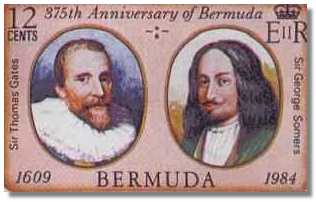Sodomy law: Virginia, May 24, 1610
"the horrible, detestable sins of Sodomie"
From the founding of the Virginia Colony at Jamestown in 1607 until 1610 apparently no law of that colony dealt specifically with "sodomy" or "buggery."[1] But the English statute making "buggery" a felony punishable by death was implicitly regarded as in force.

In 1610, Sir Thomas Gates, governor of the Virginia Colony, first issued the "Articles, Laws, and Orders, Divine, Politique, and Martial," a code placing Virginia under martial Iaw--a law including the earliest-known English-American penalty for "sodomy." The ninth provision of the Virginia legal code of 1610 read:
No man shall commit the horrible, detestable sins of Sodomie upon pain of death; & he or she that can be lawfully convictled of Adultery shall be punished with death. No man shall ravish or force any woman, maid or Indian, or other, upon pain of death....
Fornication was also penalized, by a whipping for the first and second offense, and, for a third offense, by a whipping three times a week for a month, and a public apology in church. Martial law remained in force in Virginia until 1618, From that year until 1661, the laws of England were apparently informally adopted by the Virginia settlers.
The code, later elaborated upon by Governors De La Warr and Thomas Dale, remained in effect until 1618.[3]
Background
Some background explains the genesis of this sodomy law. By 1609, the heads of the London Company, the corporate owners of the Virginia Colony, felt the need for strict discipline in the settlement because they did not think the colonists were willingly channeling their full energies into work.
On the London Company's initiative, Governor Gates proclaimed, and Governors de la Warre and Dale later maintained that martial law, including a long list of capital crimes. Among other offenses, death was provided for impious or treasonous speech, blasphemy, sacrilege, theft, illegal trade with the Indians, and the "sins of Sodomie." The plural "sins" probably referred to bestiality as well as male-male contacts. A series of lesser crimes were penalized by physical mutilation or other brutal retribution. The laws were enforced with a vengeance by the governor's personal decree, without trial by jury.
These "ruthless policies," says historian Alden T. Vaughan, "rested on the assumption that the colony's plight necessitated stringent discipline." In England, Vaughan says, "Family, church, community, and government guided personal and group behavior. Virginia [at this time] had few such controls: almost no families, few clergymen, scattered and unstable communities, and an unpredictable government that took orders from a commercial organization." During its first decade "Virginia was essentially a military post serving a trading' company." The colony's rulers were soldiers, recruited to defend the American outpost and impose order on its inhabitants. The London Company, sure that the colony had become a place for "Parents to disburden themselves of lascivious sons, masters of bad servants, and wives of ill husbands," initiated martial law as of "most dispatch and terror and fittest for this government." The Company heads decided that dissolute Virginians required "severe discipline ... , sharp laws ... , a hard life and much labor."
Return to Age of Sodomitical Sin index • Go to next article
References
- ↑ Jonathan Ned Katz, Gay/Lesbian Almanac (NY: Harper & Row, 1983), pp. 68-69, which cites background information in Alden T. Vaughan, American Genesis: Captain John Smith and the Founding of Virginia (Boston: Little, Brown, 1975), pp. 77-81. The adoption in Virginia, in 1661, of the laws of England is mentioned by Thomas Jefferson in Noles on the State of Virginia (New York: Harper & Row, 1964), p: 126.
- ↑ Image source: Sir Thomas Gateshttp://www.thedorsetpage.com/people/Images/George_Somers_1.jpg
- ↑ Law text in [William Strachey], For the Colony in Virginea Britannia . . . (London: Walter Burr, 1612); reprinted in Peter Force, compiler, Tracts and Other Papers, Relating Principally to the Origin, Settlement, and Progress of the Colonies in North America . . . (1844) (New York: Peter Smith, 1947), pp. 9-10. This martial law is cited by Bullough, Sexual Variance, pp. 507, 526, quoting an unreliable secondary source.